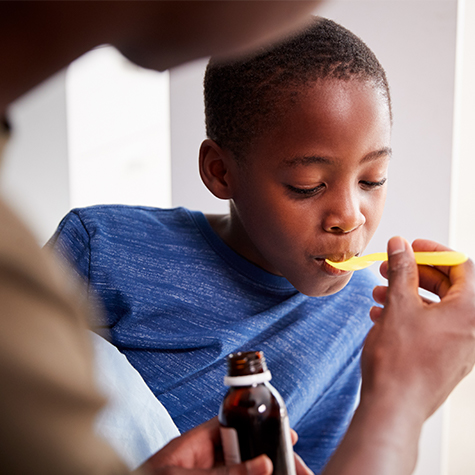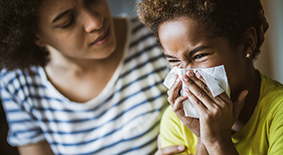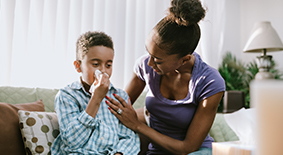Walking Pneumonia Cases Are on the Rise
More kids are being diagnosed with this generally mild respiratory infection, including younger kids ages 1 to 4. Here’s what you need to know about symptoms, treatment and when it’s time to see a doctor.
What Is Walking Pneumonia?
With an increase in cases of walking pneumonia, many parents are asking questions such as: “What is walking pneumonia?” “How long will walking pneumonia last?” and “Is walking pneumonia contagious?” Fortunately, walking pneumonia in kids is not as scary as it sounds. Walking pneumonia is commonly caused by the bacteria Mycoplasma pneumoniae (M. pneumoniae). This common respiratory infection actually got its name because it usually causes milder symptoms than typical pneumonia, so people who are infected can typically “walk around” and go on about their day.

How do kids get walking pneumonia?
M. pneumoniae is contagious and is primarily spread by respiratory droplets. “If someone who's contagious coughs or sneezes and you inhale those respiratory droplets or get them into mucous membranes, then you can become infected,” explains pediatric infectious disease specialist, Matt Linam, MD. Infections usually occur after close extended contact with a contagious person, which can frequently occur in households, daycares and classrooms.
Is walking pneumonia in kids common?
According to the Centers for Disease Control and Prevention (CDC), there are around 2 million cases of M. pneumoniae in the U.S. each year, and it’s most common in kids ages 5 to 17. But, says Dr. Linam, there’s been an uptick in diagnoses, including among younger kids ages 1 to 4. “We’re seeing M. pneumoniae infections in kids younger than we typically see,” he says.
What Are the Symptoms of Walking Pneumonia?
Walking pneumonia has no distinctive symptoms. Additionally, unlike other respiratory illnesses such as croup or whooping cough, walking pneumonia cough doesn’t have a characteristic sound. Often, in fact, signs of walking pneumonia can be mistaken for those of another respiratory infection, coming and going without anyone knowing the true cause of the illness. “More often than not, it’s a relatively mild, self-limiting respiratory tract infection,” says Dr. Linam.
Symptoms of walking pneumonia can persist for approximately seven to 10 days. Some of the most common include:
- Cough
- Sore throat
- Fever
- Headache
In kids younger than 5, walking pneumonia may also cause:
- Diarrhea
- Vomiting
- Runny nose
When Does Walking Pneumonia Require a Doctor’s Visit?
Walking pneumonia is typically a mild illness. However, it can progress or cause complications, particularly in kids with other respiratory conditions like asthma. If symptoms worsen or if the illness continues for two weeks or more, it’s time to see your pediatrician.
“If your child’s illness is not getting better at all or it’s getting worse, that's always a good reason to go in and get them checked out to make sure that they don't have something else going on,” says Dr. Linam.
If your child has severe symptoms, don't hesitate to take them to the emergency department:
- Difficulty breathing
- Breathing fast and hard
- Bluish color around the lips
- Trouble keeping fluids down or dehydration
How Is Walking Pneumonia Diagnosed?
Distinguishing walking pneumonia from other types of pneumonia or respiratory illnesses can be a challenge. If your child’s symptoms are mild, your doctor may recommend supportive care without further testing. To confirm the best treatment for more serious illness, your child’s doctor may do one of the following tests to get a definitive diagnosis:
- A nasal swab, also called a respiratory pathogen panel
- A blood test to look for antibodies that signal a current or recent M. pneumoniae infection
“The nasal swab is the primary way a clinician will determine whether someone has M. pneumoniae,” says Dr. Linam.
How Is Walking Pneumonia Treated?
If your child has mild walking pneumonia, supportive care may be all they need to stay comfortable and get well. Supportive care may include the following:
- Giving them medication like ibuprofen or acetaminophen to control fevers.
- Keeping them well hydrated.
- Doing a saline rinse to relieve nasal congestion.
- Giving older kids lozenges (cough drops) for a sore throat.
Can antibiotics treat walking pneumonia?
If tests confirm your child’s M. pneumoniae diagnosis, your doctor may prescribe medication such as antibiotics if symptoms are prolonged and more severe. “I’m always going to recommend testing before starting antibiotics.” says Dr. Linam.

Avoiding Medication Mistakes
Follow these tips to avoid making mistakes when giving little ones medicine.
learn moreHow Long Is Walking Pneumonia Contagious?
As long as your child is symptomatic, there’s a good chance they’re contagious. Walking pneumonia cough can linger even after your child is feeling better. To be safe and prevent the spread of walking pneumonia, particularly among those who are elderly or immunocompromised, help your child take precautions until they’re entirely symptom-free. This includes:
- Covering the mouth and nose with an elbow when coughing and sneezing.
- Washing hands regularly.
- Avoiding others who are immunocompromised.
- Wearing a mask in public places.
Dr. William Matthew Linam is a board certified infectious disease pediatrician at Children’s Healthcare of Atlanta. He completed his medical education at the University of Tennessee Health Science Center, and completed his internship, residency and fellowships in infectious disease and quality improvement at Cincinnati Children’s Hospital Medical Center. He is passionate about improving the quality and safety of care provided to children, with a special focus on preventing healthcare-associated infections.
This content is general information and is not specific medical advice. Always consult with a doctor or healthcare provider if you have any questions or concerns about the health of a child. In case of an urgent concern or emergency, call 911 or go to the nearest emergency department right away. Some physicians and affiliated healthcare professionals on the Children’s Healthcare of Atlanta team are independent providers and are not our employees.
Contact Us 404-785-KIDS (5437)




